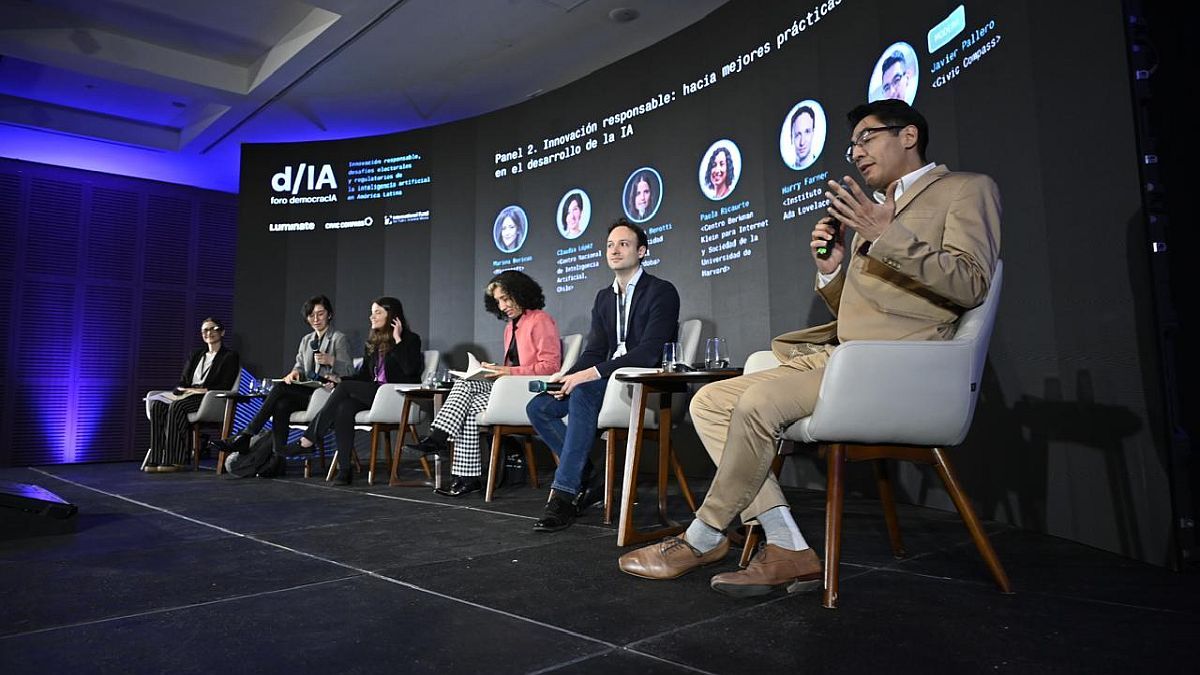The governance window for artificial intelligence (AI) is closing and Latin America needs to act now to ensure that technology is at the service of human rights and does not further deepen inequalities in the region. This is what more than 20 specialists warned at the DemocracIA Forum. The meeting, organized by Luminate, Civic Compass and the International Fund for Public Interest Media (IFPIM), brought together more than 200 people at the Museum of Modern Art in Buenos Aires.
“As the most unequal region in the world, Latin America has the opportunity to lead the technological revolution focused on human rights and social justice, but it must act soon. It is crucial to adapt regulatory frameworks to their local context, avoiding copying external rules without considering regional realities,” said Stephen King, CEO of Luminate.
The first panel discussed perspectives on AI regulation to bridge the gap between the Global North and South. Maroussia Lévesque, PhD candidate and professor at Harvard Law School, highlighted that when it comes to adopting regulatory parameters, the industry view predominates over the public interest: “Big companies are prioritizing speed over security, because the winners of this innovation race take the biggest market share.”
Moderated by Gabriela Hadid, director of Luminate for Latin America, this first panel also highlighted the importance of the participation of countries and diverse voices from the Global South in international discussions on regulation: “The initiatives we see are very valuable, but they leave out most of the world. There is no truly global participation. Thus, we run the risk of putting the interests of countries and particular actors that have the political and economic leadership of technology above humanity,” warned Vanina Martínez, senior scientist at the Barcelona Institute for Artificial Intelligence Research. The expert highlighted that this year a first agreement was reached that commits countries to start a global dialogue on governance within the framework of the United Nations.
For his part, Horrara Moreira, project management officer at the Change Centre
Exponentials from the Beja Institute in Brazil stated that it is essential that regulations consider the effects of AI on the most vulnerable groups in society: “The concentration of power in companies impacts different populations differently. One concern with the AI regulation proposal that is most advanced in Congress in Brazil is the impact on poor and black communities.” In addition, she referred to the recent closure of X: “The platforms have created a narrative around freedom of expression but what is being challenged is the democratic way in which countries organize themselves to regulate technology.”
A warning about emerging biases
The second panel, moderated by Javier Pallero of Civic Compass, focused on how to innovate responsibly. Claudia López, a senior researcher at the National Center for Artificial Intelligence in Chile, said it is key to recognize the limits and flaws of AI, make them transparent, and communicate them to society. “It is very important that countries in the Global South take ownership of AI and stop being just users and providers of data. This requires infrastructure, skill, and control of our data. We must rethink how we distribute the benefits and costs of AI,” she said.
For her part, Luciana Benotti, associate professor at the National University of Córdoba, observed that, although much is said about social biases – derived from people’s prejudices – very little is said about emerging biases in AI. Benotti explained that emerging biases occur when AI models are trained in one context but used in others. “There are emerging biases in content moderation systems that lead to hate speech. To mitigate them, participatory and community design is key, performing error analysis discriminated by different social groups, documenting training data and educating those with less power,” she said. Paola Ricaurte, associate professor at the Berkman Klein Center for Internet and Society at Harvard University, warned that Latin America provides natural resources, data and cheap labor for the development of AI, and that users and governments in the region pay very high costs for these technologies. “If we do not radically change the conditions of the game, we will see an increase in inequality in Latin America and globally,” Ricaurte said.
Gendered misinformation: AI affects female candidates more
The final panel discussed the impact of AI on elections, moderated by Julia Pomares, co-founder of the Latin American Chapter of the Global Initiative for Digital Governance. Menno Cox, Head of Sector for Global Issues for Digital Services and Platforms at the European Commission, highlighted the operation of the EU Digital Services Act (DSA) during this year’s elections. The DSA is the European legislation for social media platforms, and is therefore central in dealing with the issues of dissemination of disinformation and hate speech online, including with AI. Cox highlighted that the law allowed institutions to prepare for the elections, and stated that no serious incidents of disinformation were recorded. She also explained that it is essential to have independent electoral institutions and argued that, thanks to the new regulation, companies are obliged within the European Union to respond to requests for access to information and be held accountable at the request of the Commission.
Fernanda Martins, director of Research and Development at InternetLab in Brazil, which has municipal elections in October, warned about “gendered disinformation” and noted that electoral disinformation affects female candidates more, who are targeted by deep fakes with sexual content that should be considered a form of violence.
Finally, the panel highlighted the importance of journalism and the media in ensuring the integrity of information. At the same time, faced with the risk of disinformation and the dissemination of illegal content, the experts indicated that AI can strengthen the work of journalism to counteract the negative effects of this technology on public debate.
Source: Ambito




